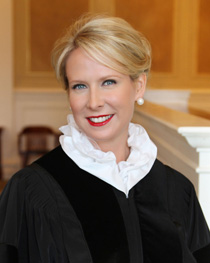Federal judge denies Arkansas justice's bid to halt attack ads by conservative DC group

Arkansas Supreme Court Justice Courtney Goodson.
A federal judge in Little Rock has refused an Arkansas justice’s request to halt attack ads by a conservative Washington, D.C., group that supports her election opponent.
In a decision on Thursday, U.S. District Judge Brian Miller said granting the injunction requested by Justice Courtney Goodson would amount to “a constitutionally impermissible prior restraint on speech.” Miller also said Goodson appears unlikely to succeed on her defamation claim. The Associated Press, the Arkansas Democrat-Gazette and the Arkansas Times have coverage.
Miller said Goodson was a public official, requiring her to support her defamation claim with proof of actual malice, a standard that requires a “high degree of awareness of … probable falsity.” He also noted that the ads concerned political speech, and any restrictions on debate about a candidate’s qualification “should be approached with extreme caution.”
The attack ads were financed by the Republican State Leadership Committee’s Judicial Fairness Initiative, an independent expenditure committee that works to elect conservatives to state courts.
The TV ad states: “Courtney Goodson took a $50,000 trip to Italy on a donor’s yacht. And hundreds of thousands in contributions from law firms [that] go before her court. Huge gifts from donors. How can she be fair? Reject scandal. Reject Courtney Goodson.”
The trip to Italy was a gift to Goodson and her husband from a personal friend and lawyer, W.H. Taylor. Evidence indicates that Goodson complied with judicial ethics rules by disclosing the gift and recusing herself from cases involving her husband and Taylor, the opinion said.
Goodson’s campaign did accept donations from plaintiffs’ law firms. But Goodson said she complied with rules that bar her from soliciting such contributions and bar her from knowing who made them.
There is no evidence proving that Goodson has a bias in favor of particular litigants or lawyers, Miller said.
But the statements in the ads don’t explicitly connect any particular gift with any specific ruling, although there is an implication of a connection, Miller said. “Because each fact is true in isolation, it seems unlikely that” Goodson will be able to prove that the Judicial Fairness Initiative acted with actual malice, he wrote.
The Italy vacation also was one of the subjects of a campaign mailer. The mailer also raised another issue with these statements:
After the Italy vacation, “Goodson turned to Arkansas taxpayers to support her lavish lifestyle by asking for an additional $18,000 pay raise. Courtney Goodson was already paid almost $150,000 a year when she received a $16,000 pay raise in 2015, making her one of the highest paid officials in Arkansas with a salary even bigger than the governor’s.
“In 2017, Goodson requested another pay raise of $18,000. If Courtney Goodson gets lavish trips, what do the trial lawyers get from Courtney Goodson? On the Supreme Court, Goodson consistently sides with the trial lawyers, issuing legal opinions that make them millions more in their lawsuits.”
Goodson says she didn’t personally ask for the raise. Rather, the state’s chief justice asked for the pay hike on behalf of every member of the court after a vote. During a court hearing, Goodson was directed to answer a question about whether she personally voted for the raise. She said she did not vote for the raise.
Although the Judicial Fairness Initiative did not confirm whether Goodson voted for the pay raise before running the announcements, “nothing indicates it acted with actual malice when it assumed she supported the request,” Miller said.
Goodson’s testimony, however, has now placed the group on notice that she voted against the raise, Miller said.
Despite the loss, Goodson’s lawyer, Lauren Hoover, put a positive spin on the decision. “The court ruled there was no evidence presented yesterday that Justice Goodson has ever given special treatment to any person or interests despite what is implied by the ads,” Hoover said. Hoover also said the fight “has put some sunshine” on the funneling of dark money by outside groups into judicial elections.
Goodson told the Democrat-Gazette that she was disappointed in the outcome, but the opinion did clear her name.
A spokesman for the Judicial Fairness Initiative, David James, also commented. “A much better judge than Courtney Goodson just tossed her latest, outrageous assault on the First Amendment,” he said.
The litigation is not Goodson’s first attempt to block ads. She previously sued TV stations to block ads by the Judicial Crisis Network, leading a state court judge to issue an initial order halting the ads in central Arkansas. The decision is on appeal. Another judge allowed the ads to continue in Northwest Arkansas.



